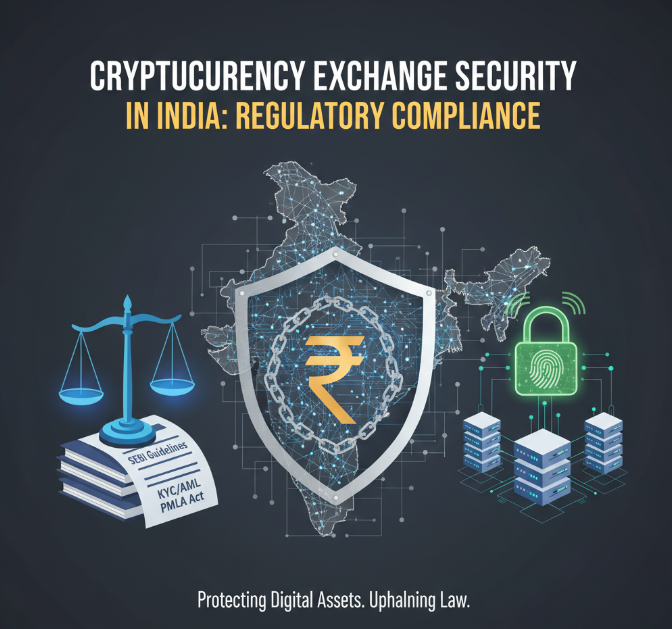Cryptocurrency Exchange Security in India: Regulatory Compliance

Introduction: India’s Rapidly Maturing Crypto Ecosystem
While cryptocurrencies are not legal tender in India, holding, trading, and investing in virtual digital assets (VDAs) is permitted under strict regulation. The regulatory focus prioritizes financial stability, fraud prevention, and integration with national digital initiatives like the Digital Rupee.
Legal Status and Permissible Activities
- Cryptocurrencies are legal to hold, trade, and invest as long as exchanges and platforms comply with government-mandated KYC/AML, taxation, and reporting standards.
- Crypto cannot be used for payments or settlements of goods/services; only for trading and investing as digital assets.
- Only registered exchanges—domestic and FIU-IND (Financial Intelligence Unit–India) compliant international platforms—are allowed to operate legally.
Key Regulatory Bodies and Oversight
- Ministry of Finance: Policy-setting, taxation rules, and future legislation.
- RBI: Operational guidance for banks interacting with exchanges, CBDC pilot (Digital Rupee), and systemic stability.
- FIU-IND: Enforcement of AML/KYC standards under the Prevention of Money Laundering Act (PMLA) and licensing of VDA Service Providers.
- CBDT: Oversight of tax compliance and reporting.
- SEBI: Potential oversight of crypto-based securities and sandbox initiatives.
Core Compliance Obligations for Exchanges
- Mandatory FIU-IND Registration: All domestic and offshore exchanges must register and adhere to periodic reporting, including Suspicious Transaction Reports (STRs), high-value transaction disclosures, and cooperation with law enforcement.
- AML/KYC: Banking-level verification for every user, following the FATF Travel Rule—detailed sender/receiver data for all transfers, even with no minimum threshold.
- Recordkeeping: Exchanges must store transaction and customer records for at least five years, with systems for audit trails and law enforcement requests.
- Quarterly Compliance Reporting: Detailed regulatory reports for AML standards, customer identification, transaction monitoring, and financial health.
Security Framework for Cryptocurrency Exchanges
Effective security demands multi-layered risk controls:
- User Identity Management: Strict onboarding, mandatory PAN-Aadhaar linking, and periodic KYC refreshes.
- Transaction Monitoring: Real-time, AI-driven fraud detection for abnormal patterns, privacy risks, and account compromise attempts.
- Cold and Hot Wallet Controls: Segregation of operational funds and user deposits; encrypted key management and multi-signature access for large transactions.
- Platform Security: End-to-end encryption, DDoS mitigation, API gateway firewalls, vulnerability patching, frequent VAPT audits, and zero-trust architecture for exchange infrastructure.
- Employee Training: Continuous regulatory, technical, and incident response training to mitigate insider and social engineering threats.
Cryptocurrency Taxation Rules in India
- Flat 30% tax on all profits from crypto sales, irrespective of holding period.
- 1% TDS on all crypto transactions above ₹10,000 annually (₹50,000 for specified persons).
- Losses cannot offset other income or be carried forward; only acquisition cost is deductible.
- Crypto income and holdings must be declared in the annual Income Tax Return (ITR); undisclosed assets may face higher penalties.
PAN-Aadhaar Linking and Reporting Norms
- Mandatory PAN-Aadhaar linking for user accounts—non-compliance renders accounts inoperative and subjects assets to higher tax rates.
- Exchanges and traders must disclose detailed transaction, holding, and transfer activity in ITR filings to avoid heavy penalties.
Licensing and Future Regulatory Developments
- FIU registration is now effectively a license to operate.
- Foreign exchanges re-entered the market after registration and fines; domestic platforms compete on compliance, security, and transparency.
- Policy discussions continue on comprehensive crypto bills, token classification, and potential sandbox initiatives for new products (DeFi, NFTs, advanced custody).
- FATF Travel Rule and anti-money laundering best practices now underpin all operational mandates, keeping Indian rules aligned with international standards.
Risk Management: Technology and Operational Resilience
- Exchanges must invest in AI-powered monitoring, endpoint security, rapid incident response, and continuous VAPT.
- Cross-functional disaster recovery plans and robust internal controls form the backbone of operational security, with regulatory fines and business reputation at stake for lapses.
Conclusion: Responsible Participation in India’s Crypto Future
Regulatory clarity is driving innovation but demands responsibility—FIU registration, strict KYC/AML, tax reporting, and robust cyber defense are now basic prerequisites to operate or trade in India’s crypto sector. Investors and businesses must align with these evolving frameworks to sustain growth and avoid regulatory and reputational risks
Take the Next Step with CodeSecure Solutions
Cyber threats are growing more sophisticated every day. With a trusted partner by your side, you can safeguard your business while focusing on what truly matters—growth and innovation.
At CodeSecure Solutions, we deliver comprehensive cybersecurity services in Chennai, uniquely tailored for startups, SMEs, and enterprises:
- Vulnerability Assessment & Penetration Testing (VAPT)
- Network Security Solutions
- Compliance Support (ISO 27001, PCI-DSS, HIPAA, DPDP Act, GDPR)
- Cloud & Endpoint Protection
- Security Awareness Training
No matter your industry or size, CodeSecure customizes solutions to fit your needs—ensuring your data, reputation, and operations remain secure.
Ready to Strengthen Your Defenses?
- 📞 Call: +91 73584 63582
- ✉️ Email: vapt@codesecure.in
- 🌐 Visit: www.codesecure.in
Stay secure. Stay informed. Choose CodeSecure Solutions—your partner in cyber resilience.
